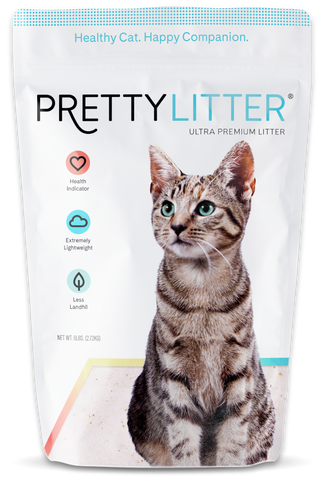When you bring a new cat into your home, you're taking on a commitment that will most likely span several years. In addition to giving your kitty love and attention, you'll also need to be prepared to provide medical care. We all get sick from time to time, and cats are no exception. Here are a few of the most common ailments cats acquire, beginning with:
Obesity

Just like us, our pets are prone to obesity too, and for many of the same reasons: lack of exercise and over-reliance on cheap, processed food full of sugar and extra calories.
Guess what most of today's dry cat food is made from? That's right: fillers and the feline equivalent of junk food. Combined with the fact our pampered pets don't have to hunt for their food anymore and instead spend most of their time snoozing, that's the perfect recipe for weight gain that can put unnecessary and dangerous stress on your cat's bones and organs.
You can help your kitty maintain a healthy weight by encouraging lots of play time, feeding her a nutritious meat-based diet, and limiting treats and carbohydrates.
Diabetes

Often related to the obesity problem is the growing incidence of feline diabetes. An estimated 0.5% to 2% of cats suffer from diabetes mellitus, a condition in which the body can't produce or use the insulin needed to maintain healthy blood sugar levels. Left untreated, it can lead to malnutrition, organ damage, coma, and even death.
As in humans, diabetes may have a genetic component, and cats with certain attributes may be at higher risk of developing the illness. Obese, elderly, and/or physically inactive cats are especially at risk, but so are cats who are male, neutered, and/or undergoing steroid therapy. Burmese cats in particular are at a higher risk than other breeds as well.
Again, just like in humans, the first signs of diabetes are weight loss accompanied by increased appetite and excessive thirst and urination. If you notice these symptoms, have your cat checked by his veterinarian. The vet will likely order a blood test to confirm the diagnosis, and then she or he will develop a treatment plan with you that could include dietary changes with special food, exercise regimens, insulin therapy, and more.
The good news is that with proper management, your kitty can live a long and happy life.
Kidney Failure

Kidney failure is one of the leading causes of death in cats. While it is sometimes sudden and unpredictable, there are some risk factors to keep in mind and some ways you can help prevent kidney disease or slow its progression.
In both acute and chronic kidney failure, symptoms to watch out for include increased thirst and/or urination, weight loss, vomiting, and bad breath. The earlier these symptoms are spotted and addressed, the better the outlook for your kitty's long-term health.


Pet parents should limit their cat's exposure to toxic substances, which includes things like antifreeze and household cleaners, human and veterinary medication, and certain plants, especially lilies, as all parts of the plant are highly toxic to cats.
Some breeds are more genetically prone to developing kidney disease, such as Abyssinians and Persians. However, all cats are at risk, so regular checkups are critical, most of all for senior cats who might have other conditions like diabetes that put them at higher risk for developing kidney disease.
Hyperthyroidism

An overactive thyroid gland can dump too much of the thyroid hormone into the bloodstream, a condition known as hyperthyroidism. This ailment is most common in elderly cats around 13 years of age or older. Symptoms can mimic a host of other conditions, including diabetes and kidney disease, so only a veterinarian can make a proper diagnosis. Some signs to watch for include:
- weight loss
- increased appetite, thirst, and urination
- dull coat
- increased vomiting
- weakness or depression
Your vet will go over treatment options with you, which include dietary therapy, surgery, medication, and radioactive iodine therapy. If your cat is otherwise healthy, the prognosis is usually good with appropriate treatment.
Parasites

Fleas, ticks, and ear mites are some of the most common pests cats and cat owners have to face. Fleas and ticks are parasites that live on the animal and ingest its blood to survive, while eat mites are microscopic bugs that live on and in the cat's ear. Fleas and ticks can transmit dangerous diseases through blood contamination, and ear mites can cause damage to the ear drum and affect the cat's hearing and sense of balance. In all cases, these pests can cause discomfort and chronic itching, and when the cat bites and scratches at these spots, they can scratch their skin and leave themselves open to possible infections.
The best way to avoid such parasites is to limit your cat's exposure to the outdoors and to other cats. If you bring a new cat into the home, be sure to check it thoroughly for parasites. If you find any, try to keep that cat quarantined as much as possible. If you suspect a flea or mite outbreak, treat all of your cats and the places they like to hang out at the same time, as the bugs are highly contagious and can spread quickly.
Check your pets regularly for signs of fleas and other unwanted guests, and tackle any potential problems immediately to help ward off a full-blown infestation. If you live in an area where these nasty critters are common, or if your cat insists on going outside, speak with your vet about a monthly topical or pill treatment to kill off any parasites before they can cause too much damage.
----
Don't forget to follow us on Instagram: @prettylittercats
----
Delivered straight to your front door, every month. We’ll even pay your shipping.



Follow Us